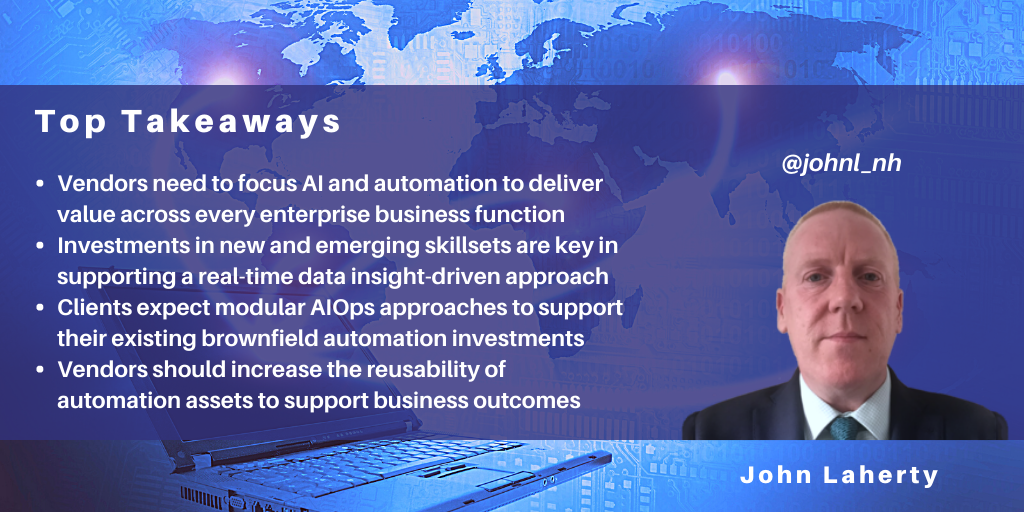Search posts by keywords:
Filter posts by author:
Related Reports
Related NEAT Reports
Other blog posts
posted on Mar 17, 2023 by John Laherty

NelsonHall recently completed an in-depth analysis of cognitive & self-healing IT infrastructure management services, researching the capabilities of leading IT services vendors and the requirements of their clients. This blog looks at the investments vendors need to make to meet client demand, and how the market will evolve over the next 12 to 18 months.
While there is an increasing focus on utilizing AI and automation to deliver value across every business function within an enterprise including, for example, providing CFOs with contractual commitments to automation-led savings, the use of automation and AI is arguably most advanced in IT infrastructure management.
This increased use of automation and AI within IT infrastructure management is leading to:
- Increasing demand for SRE-led operations to support greater predictability across the full-stack
- A massive ramp-up in digital reskilling and the emergence of new skill sets
- Increased focus on sustainability and ESG.
Increasing demand for SRE-led operations to support greater predictability across the full stack
To achieve a NoOps environment, enterprises need to adopt a real-time data insights-driven approach, with SREs approving self-heal solutions and machine recommendations and developing algorithms for AIOps and automation use cases.
AIOps is already being deployed to trigger automation to auto-remediate, fix issues, detect anomalies, and reduce noise across operations. End-user outcomes typically achieved so far include ~40% improvement in MTTR, ~50% reduction in P1 incidents, and ~65% of incidents autonomously resolved. However, there is scope for more.
AIOps needs to support both full-stack monitoring and accommodate existing enterprise investments. It enables the accommodation of rapid infrastructure changes across hybrid, private cloud, and on-premise; and in addition, the full-stack monitoring of resources in the cloud and on-premise. Enterprises also want modular, plug-and-play AIOps platforms utilizing vendor IP and third-party tools across their ecosystems. The modular approach is important for supporting the existing brownfield automation investments made by enterprises.
There will be increased investment in automation and IaC to enable developer-centric models that extend from DevOps to DevSecOps to NoOps in an agile manner and use DevSecOps to support cloud-native applications. Vendors will continue to expand their use cases and focus on hyper-automation to enable client transition to a future NoOps environment. This involves continuing to develop libraries of AIOps use cases to manage operations across the full stack and achieve 40-50% reusability of assets.
In addition, over the next 12 months, vendors will increasingly focus on dedicated experience centers, supported by SRE teams that look at the performance and experience aspect of IT service delivery and proactively monitor end-users’ sentiments as they engage across services and XLAs (and increase client-specific XLAs by persona). At the same time, there will be greater standardization of XLAs in support of a NoOps environment.
Massive ramp-up in digital reskilling & emergence of new skill sets
The investment in digital reskilling and new partnerships continues at pace. We continue to see traction in digital re-skilling, hyperscaler, and ecosystem partner certifications along with AI architects, cloud-native SMEs, and business value specialists. All vendors are ramping automation academies, proactive experience centers, AI, and Cloud CoEs to monitor performance through a data-driven approach. They enhance what SRE and automation teams learn from operating cloud and infrastructure environments.
In addition, newer skill sets are emerging, including machine coaches developing algorithms for AIOps systems, data modelers, and domain SMEs to support unified business semantics. For example, Kyndryl is developing higher-level skill sets at L2/3, including automation assessment architects and client success engineers. TCS is using its cloud units as a catalyst for change across the organization, enabling infrastructure specialists to become full-stack architects. The company is also expanding its Cloud Service Reliability teams and service reliability engineering approach to operations supported by SRE CoEs, and expanding its value builders within TCS Cognix, to enable autonomous operations through AIOps and MLOps. Likewise, Infosys is developing SRE automation skill sets supporting its Polycloud platform across ~96k employees in the cloud and infrastructure services unit; and Cognizant has developed an automation-in-a-box self-service playbook for account delivery teams. Plus, DXC Technology has developed an automation roadmap by capability persona, with 90 big plays across ITO and cloud to improve each persona.
We see more focus on intelligent OCM to drive digital adoption and device and sentiment insights to inform training methodologies and technology adoption rates. Unisys, for example, applies AI to its OCM engine to target and tailor technology adoption and updates, training, and enhanced experience by persona.
We expect increased investment in AI-based platforms, strategic ecosystem partnerships, and a greater focus on joint IP and GTM with hyperscalers.
Increased focus on sustainability and ESG
Investment in cognitive and self-healing IT infrastructure management services will continue at pace, focusing more on SRE-led operations by default. This in turn will lead to an increased focus and investment in sustainability and ESG, helping clients reduce carbon footprints. TCS, for example, through TCS Cognix for agile infrastructure, adopts a sustainability-by-design approach to drive configurable, composable, and automated infrastructure to adapt the cloud to ESG needs. DXC Technology has developed an ESG data intelligence and reporting solution. In addition, Infosys is rapidly expanding its sustainability practice to support enterprises’ ESG agendas.
Outlook
Investment in cognitive and self-healing IT infrastructure management services will continue to ramp, focusing more on SRE-led operations, including full-stack organizational structure for delivering digital transformation through productized offerings.
Vendors need to focus on automation and cloud academies, AI-enabled learning assistants, and platforms to expedite training. We expect to see expansion in the developer community for automation use case development and deployment; and finally, more focus on hyper-personalization, including developing industry-specific personas and creating AI solutions and use cases to fit key business requirements.
